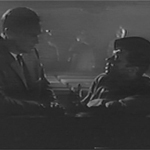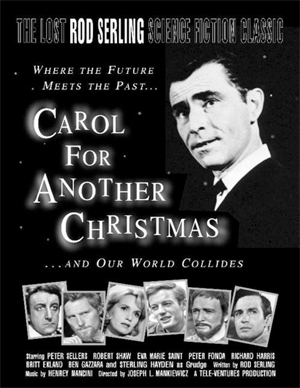 Late one snowy Christmas Eve, influential rich guy Daniel Grudge (Sterling Hayden) is visited at his mansion by his nephew, history professor Fred (Ben Gazzara, ROAD HOUSE), who confronts him about having blocked a cultural exchange program at the university. Their philosophical argument turns into yelling. After Grudge chews his nephew out and tells him to leave, Fred smiles and dryly says, “Merry Christmas, by the way.”
Late one snowy Christmas Eve, influential rich guy Daniel Grudge (Sterling Hayden) is visited at his mansion by his nephew, history professor Fred (Ben Gazzara, ROAD HOUSE), who confronts him about having blocked a cultural exchange program at the university. Their philosophical argument turns into yelling. After Grudge chews his nephew out and tells him to leave, Fred smiles and dryly says, “Merry Christmas, by the way.”
This somewhat legendary 1964 TV update of Charles Dickens’ A Christmas Carol was directed by Joseph L. Mankiewicz, his followup to CLEOPATRA and only small screen venture. But the obvious voice here is writer Rod Serling, five years after starting The Twilight Zone, sticking with his favorite trick of using genre as a vehicle for heart-on-sleeve pleas about contemporary social issues.
We learn that Grudge’s son Marley was killed in combat on Christmas Eve. This is the source of Grudge’s dislike of Christmas, but also his isolationism. He sees liberals as people who get American military men killed:
“Every few decades we seem to pay for your indiscriminate affections with the lives of our sons.”
But Fred sees it as trying not to get anybody killed: “Those indiscriminate affections as you put it are simply the acknowledgment that all men have sons. That grief for the unnecessary dead is not exclusive to this country, this town or to the House of Grudge.”
When Grudge says of his son dying in Korea, “It wasn’t his war,” Fred says that “No war is anybody’s war!” Serling, like the Grudge character, fought and lost many friends in WWII, the most justifiable American war, so he knows what he’s talking about.
Like in the Dickens story, Grudge is in for some Christmas Eve ghost visits. First he thinks he sees his son Marley’s reflection, then catches a glimpse of him sitting at his place at the table. (I couldn’t tell, but apparently he’s played by Peter Fonda, who had more extensive scenes that were cut.)
 The Ghost of Christmas Past (singer Steve Lawrence) is a soldier who represents all soldiers and all wars as he transports a boat full of coffins draped in the flags of various nations. Like Fred he debates with Grudge about his belief that people dying in other countries is “infinitely better than American blood.” As talky as this movie is, the dark and foggy look of these scenes add a very cinematic quality.
The Ghost of Christmas Past (singer Steve Lawrence) is a soldier who represents all soldiers and all wars as he transports a boat full of coffins draped in the flags of various nations. Like Fred he debates with Grudge about his belief that people dying in other countries is “infinitely better than American blood.” As talky as this movie is, the dark and foggy look of these scenes add a very cinematic quality.
Eventually the ghost brings Grudge to Hiroshima to watch an incident from his past as a military officer who drives Eva Marie Saint to visit Japanese victims in a bombed out hospital. They’re draped in ghostly bandages and one sings a haunting, sad song.
Serling’s Ghost of Christmas Present (Pat Hingle, HANG ‘EM HIGH, THE LAND BEFORE TIME) is “a walking, eating representation of the human race” who gives him what Grudge calls “my lecture about the haves and have-nots.” The ghost feasts alone at a giant table next to a camp of refugees or prisoners he calls “the barbed wire set.” When the crassness of pigging out in front of starving people upsets Grudge, the ghost provocatively solves the problem just by darkening the room so we can’t see them anymore.
The story takes an even more dreamlike turn when he meets the Ghost of Christmas Future (Robert Shaw) on a post-apocalyptic future Christmas Eve in the town’s bombed out, torch-lit meeting hall. A crowd of merry survivors come in and give a Beatlemania welcome to their leader Imperial Me (Peter Sellers), a lunatic in a Pilgrim outfit with the hat cut into a crown and a jeweled “ME” on the front.
Wobbling between a southern drawl and other American accents, Imperial Me preaches his opposition to “the people from down yonder and across the river” coming in to talk about their mutual problems. The crowd loves it. In 2016 this does not seem unlikely.
Grudge’s butler Charles (Percy Rodriguez, narrator of CAPTAIN EO) makes a speech about the importance of listening to and helping others, and the crowd laughs hysterically. They chase him up a wall and chant for him to jump. A little boy in a cowboy costume takes his “Just Like Daddy’s” brand pistol out of the box and shoots Charles, impressing his mother (Britt Ekland), who has been knitting and not even really paying attention.
Clearly it’s intentional that the only sympathetic person in the crowd is Ruby, another servant of Mr. Grudge and seemingly the only other African-American in the crowd. Serling argued that more communication and empathy between races and nationalities would make the world better. Still a good idea, you guys.
But CAROL FOR ANOTHER CHRISTMAS is quite a time capsule. One really noticeable contrast to today is how much the story seems to connect the left to fighting wars and the right to avoiding them. Of course things haven’t changed entirely – Democratic presidents Clinton and Obama both used military force, ostensibly with a philosophy similar to Fred’s here, that we have a responsibility to intervene if we think it will help our fellow man. But among us rank and file, during my lifetime, the perception has been that true leftists oppose war and rightists see wars as a righteous defense of American freedom and test for patriotism, manliness and troop support. That’s obviously a huge generalization, but until “oppose absolutely anything Obama ever does no matter what” became the ruling principle of the Republican party I had never heard of a group of conservatives opposing a war. They were so rare that any Republican that said anything at all critical about the Iraq war (Chuck Hagel, for example) instantly became a celebrity to the left.
I wish it were a simple matter. My instinct is the same as Grudge’s, to oppose America being involved in any war. But I also can’t imagine the world not stopping Hitler, and as we sit helplessly watching goodbye videos from people in Aleppo we have to wonder how the world can or could’ve helped them. I think Obama’s decision to avoid military involvement that he thought would be untenable or exacerbate the problems may have been the right one. But it sure didn’t solve the problem. If there is an answer that involves the military, shouldn’t I support it? I don’t know what the answer is.
Maybe I’m misunderstanding it, but it seems to me Fred and the ghosts are doing their argument a disservice by making it so much about wars. Couldn’t Grudge, after becoming more open to international engagements, decide he supported the escalation that was going on in Vietnam, to protect the people of South Vietnam from the spread of communism? I don’t think that’s what the ghosts want. They want international cooperation to prevent such violence. This was the first in a series of four specials commissioned by the United Nations to promote awareness about their mission.
The larger message is about having empathy for the people of other nationalities. Grudge is suspicious of anything foreign. He makes fun of the Polish professor’s name being allegedly unpronouncable, a small and accurate detail about people with this sort of attitude. Whatever happens in Syria, we also have to worry about our next president’s smearing of the refugees who are trying to escape those atrocities as dangerous potential terrorists. The Ghost of Christmas Present would definitely give Trump some shit about that kind of heartlessness/xenophobia combo. When Grudge asks what the non-English-speaking refugees behind the barbed wire are singing about, the ghost says, “Foreign words. But not necessarily conspiracies to destroy you, Mr. Grudge. Just Christmas songs, and those who do not celebrate Christmas, songs of hope. They sang them in their language before you did in yours.”
The other thing that’s really interesting compared to today is just how straight up earnest and political this television event is. I suppose we might still see that in the occasional charity concert/telethon for some tragedy or medical cause. And even in its time, CAROL received many negative reviews for its didacticness, and protests from the Birch Society and other right wingers. Still, I’m impressed that it was released, because Serling’s use of fiction to openly make his political argument seems like something that wouldn’t really be done today, when many carry the belief that movies and TV are meant to be apolitical escapism and not vehicles for ideas or passions.
The one writer it does remind me of is Aaron Sorkin. Like his stuff it’s very theatrical, dialogue heavy, idealistic, sincere. And there was that brief period when George Clooney was into doing the retro live broadcasts like FAIL SAFE. And also Steven Seagal did that speech at the end of ON DEADLY GROUND. But I guess we’re reaching pretty far back now. My point is, corniness doesn’t have to be our enemy. Sometimes it’s good to believe in things, and share your ideas with others. I enjoyed this one.


























December 29th, 2016 at 5:56 am
this sounds fucking awesome, and yeah it seems like it wasnt until the peace movement of the 60s and the vietnam debacle that the mainstream american left started to question military intervention…
and while i dont think its message is a political one (except in the sense that everything is political i guess) your description of this reminded me of sense8. its so endearingly earnest and in your face with what its saying that i can’t help but love it.